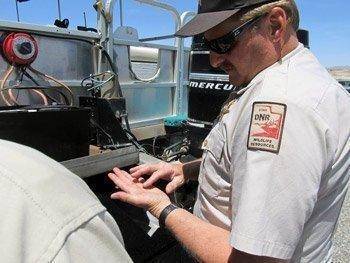DWR Press Release
Quagga mussel checkpoints will be held near Lake Powell this year. The first one happened May 13.
That day, conservation officers with the Division of Wildlife Resources checked 11 boats at a checkpoint near Big Water on U.S. Highway 89. One of the 11 boats had dead mussels on it. In this instance, the boat owner received a warning for not completing the first part of a three-step decontamination process, cleaning mud, plants and debris off his boat after removing it from Lake Powell.
Jordan Nielson, aquatic invasive species (AIS) coordinator for the DWR, said Lake Powell is infested with quagga mussels. “It’s vital, and also Utah state law, that boat owners clean all of the mud, plants, debris and shelled organisms off their boat after pulling it out of the water,” he explained. “Also, you must drain all of the water that’s inside the boat before you leave the Glen Canyon National Recreation Area.”
The third step of the decontamination process, drying your boat for a specific period of time, must be completed before the boat can be placed on a water other than Lake Powell. Nielson said the dry times are different during different times of the year. For example, in the summer, you must allow your boat to dry for seven days before placing it on another water.
You can learn how to complete the simple three-step decontamination process at www.stdofthesea.com or on our website.
If you want to place your boat on a body of water sooner than the seven-day drying time, you’ll need to get it professionally decontaminated.
The decontaminations are free. To schedule a decontamination, call any Utah State Park that has a reservoir. You can also contact your nearest DWR AIS biologist. Phone numbers for the biologists are available on our website.
Why the concern?
There are many reasons why Utahns don’t want quagga mussels, or their cousins, zebra mussels, moved from Lake Powell to other waters in Utah:
- Mussels can plug water lines, even very large diameter ones. If mussels get into water delivery systems in Utah, it will cost millions of dollars to try to remove them. Utahns would likely pay for the removal through higher utility bills.
- Mussels remove plankton from the water column, the same plankton that support Utah’s sport fish and native fish. The mussels could devastate fisheries in Utah.
- Mussels can damage your boat by attaching themselves to your boat’s hull and fouling the boat’s engine cooling system.
- When mussels die in large numbers, they stink. Their sharp shells can cut your feet as you walk along beaches where the mussels died.

